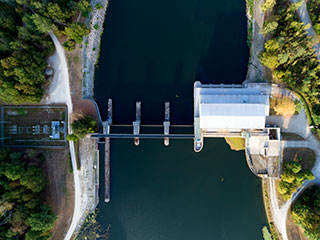About the MA in Sustainable Energy

The Master of Arts in Sustainable Energy (online) at Johns Hopkins SAIS prepares smart, driven professionals to guide the transition to sustainable energy. You’ll learn to evaluate economic opportunities, analyze financing options, and understand how international institutions shape markets.
Through ten online courses and two in-person Washington DC residencies, you’ll develop the quantitative and strategic skills needed to advance in private industry, public sector, and consulting roles.
The program matches your ambition and respects your time. You’ll complete most coursework online through on-demand lectures and weekly live sessions with faculty.
Find out more about what it’s like to be a student in our program.
MA in Sustainable Energy Program Outcomes
- Lead strategies for global energy sector decarbonization and climate change mitigation
- Master the economics and financing of sustainable energy markets
- Analyze how international institutions and global governance shape sustainable energy development
- Understand complex energy systems and their interconnections
Download the program brochure for a course list and details about admissions.
Online Courses With In-Person Experiences
This program matches the pace of professional life. We present the MA in Sustainable Energy in a part-time, online format that combines on-demand lectures with optional weekly live sessions.
In addition to online coursework, the program features two in-person residencies at the Johns Hopkins SAIS campus in Washington DC. Connect with your cohort and network with experts within the largest hub of energy policy and legislation in the United States.
1. Environmental and Energy Study Institute (EESI), “2024 EERE Investment Snapshot Report Overview: Clean Energy Developments Yield Major Benefits” (2024)
2. BloombergNEF, “Emerging Markets Make Headway on Clean Energy Policy and Investment, but Trillions More Needed for Net Zero” (2024)
3. E2, "Clean Jobs America 2024."
4. National Renewable Energy Laboratory, "State-Level Employment Projections for Four Clean Energy Technologies in 2025 and 2030."
5. IEA, "World Energy Employment, 2023."
Sustainable Energy Industry and Career Outlook

Clean energy now represents a $2 trillion market and 6% of U.S. GDP1. The opportunities span the globe: low- and middle-income economies invested $2.2 trillion in their energy systems in 2023, a 35% rise in just three years2.
As power distribution advances and technology costs fall, the renewable energy sector is looking for leaders who can navigate both policy and markets. The MA in Sustainable Energy at Johns Hopkins SAIS positions you to capture these opportunities.
Your success starts here and continues for life. As a student, you have access to Johns Hopkins SAIS’s full suite of resources, including online career counseling and connections to more than 200 employers. As a graduate, you join a global network of 230,000 Johns Hopkins alumni.
Our results speak for themselves: of the class of 2022, 100% of sustainable energy graduates secured positions in industry, fellowships, or advanced education within six months of graduation.
The clean energy sector is growing. Your career should too. Get full program details now.
3.5 million
Total number of clean energy jobs in the U.S. in 20243
1.1 million
Number of new clean energy jobs added in the U.S. by 20304
2.5 million
Number of new clean energy jobs added worldwide in 20235
1. Environmental and Energy Study Institute (EESI), “2024 EERE Investment Snapshot Report Overview: Clean Energy Developments Yield Major Benefits” (2024)
2. BloombergNEF, “Emerging Markets Make Headway on Clean Energy Policy and Investment, but Trillions More Needed for Net Zero” (2024)
3. E2, "Clean Jobs America 2024."
4. National Renewable Energy Laboratory, "State-Level Employment Projections for Four Clean Energy Technologies in 2025 and 2030."
5. IEA, "World Energy Employment, 2023."
About Johns Hopkins SAIS

For 75 years, students have come to the Johns Hopkins University School of Advanced International Studies (SAIS) to build their professional networks, learn from renowned faculty, train with policy practitioners and gain hands-on work experience.
Today, guided by the vision of its founders, the school’s cadre of expert faculty prepares students for exciting careers across sectors and around the world. With a global alumni network of more than 20,000 graduates, you can be sure to find our alumni taking action in dynamic roles. From private-sector executives to entrepreneurs, leaders of nongovernmental organizations to ambassadors, and international media correspondents to energy consultants, alumni of the school are known for being innovative thinkers and problem-solvers with the economic and policy expertise to address today’s most pressing challenges.
Rankings and Accreditation
U.S. News & World Report recognizes Johns Hopkins for its commitment to student success, excellent student social mobility, faculty as well as its reputation among leaders at other universities.
U.S. News ranks Johns Hopkins as a top-10 national university as well as top-10 in most innovative schools in the country. Some other key rankings include:
#6
Best National Universities, U.S. News & World Report
#13
Best Global Universities, U.S. News & World Report
#2
Best Graduate Programs for International Relations, Foreign Policy Magazine
